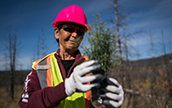Report Review Panel
We use an external review panel to strengthen our sustainability reporting. The panel helps evaluate and improve the quality and credibility of our Sustainability Report. The 2021 Report Review Panel comprised five sustainability and corporate reporting experts:
- Mandy Kirby, UK. Chief Strategist and Co-founder, City Hive (Chair of the Report Review Panel)
- Hilary Parsons, UK. Formerly Head of Creating Shared Value Engagement, Nestlé
- Vanessa Zimmerman, Australia. Chief Executive Officer, Pillar Two
- Renard Siew, Malaysia. Adviser on Climate Change, Centre of Governance and Political Studies
- Elizabeth White, USA. Strategist and Global Head Environment and Social Sustainability, Sector Economics and Impact, IFC World Bank Group.
The panel provided input into our topic selection process. Panel members reviewed the report, discussed Shell’s reporting and spoke to relevant Shell employees before preparing their statement. The panel’s mandate focused on the quality of Shell’s reporting, including credibility, completeness and responsiveness. The panel is not accountable for reviewing the data in the report or material on shell.com outside the bounds of this report. Panel members are offered an honorarium for their input.
Find out more about the panel at www.shell.com/sustainability-report-review-panel.
Report Review Panel recommendations
The panel has had the opportunity to review two drafts of the 2021 Sustainability Report and provided both written and verbal feedback to Shell. During this process, Shell has considered our feedback in relation to the quality of sustainability reporting, particularly regarding content and presentation of information.
The panel notes that while the report is situated within the wider shell.com suite of information, the panel has not reviewed content on the website, nor is this part of its remit.
The panel notes that Shell has undertaken significant changes to its approach in the Sustainability Report that reflect a shift in how different stakeholders access information. We welcome the clear movement towards the inclusion of more sustainability-related data within the Annual Report as a signal that it is business-critical and strategic information. We also note that the Sustainability Report has been designed to support stakeholders who wish to access sustainability data. More qualitative content and relevant information material to the organisation, which was previously included in the report, now sits on the main website.
While understanding the evolution of reporting, we note the importance of ensuring that readers who wish to engage further on a topic are directed to the website to find up-to-date and relevant information.
We encourage Shell to think particularly about providing context to sections in which data are presented. Such context would help readers interpret the quantitative information in the report. In addition, we suggest paying special attention to the presentation of visual, tabular and graphic information. These are all useful instruments to convey complex information as long as they are accessible to lay readers, for example by providing relevant comparative elements, benchmarks and signposts to significant data points.
There are areas of disclosure that we welcome particularly, including continued efforts on tax transparency, supplier conduct and compliance, as well as confirming where activities such as Arctic Circle activity will not take place, as well as where they could.
Language in some areas has become more precise and aligned to relevant international standards and external expectations. For example, Shell now uses the term net carbon intensity in relation to measuring progress against net-zero emissions targets.
Looking ahead to the 2022 report, the panel would encourage Shell to:
- Provide clear context for data that are presented;
- Sufficiently explain how Shell plans to reach its targets;
- Depict progress against targets over time;
- Strengthen the human rights section with more explicit information about engaging with suppliers and other business partners, including joint-venture partners, to explain how human rights impacts throughout the value chain are being addressed in line with core international standards;
- Clearly explain what topics are material for Shell;
- Provide data assurance for sustainability topics beyond climate;
- Draw more connections between different ESG issues [including climate and human rights]; and
- Present more reflections on challenges that may have occurred during the year including steps it is taking to respond to litigation, advocacy campaigns or other incidents as appropriate and taking into account external stakeholders’ expectations.









